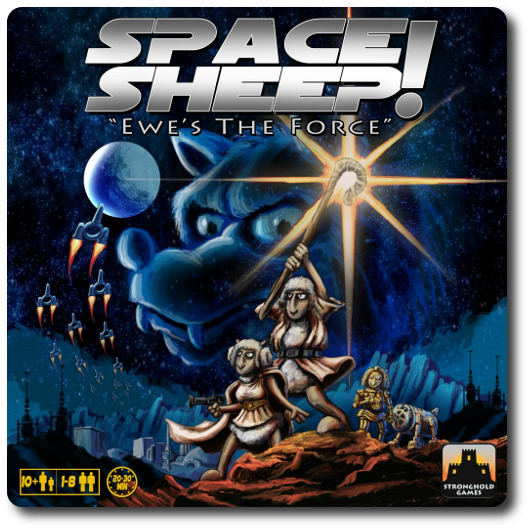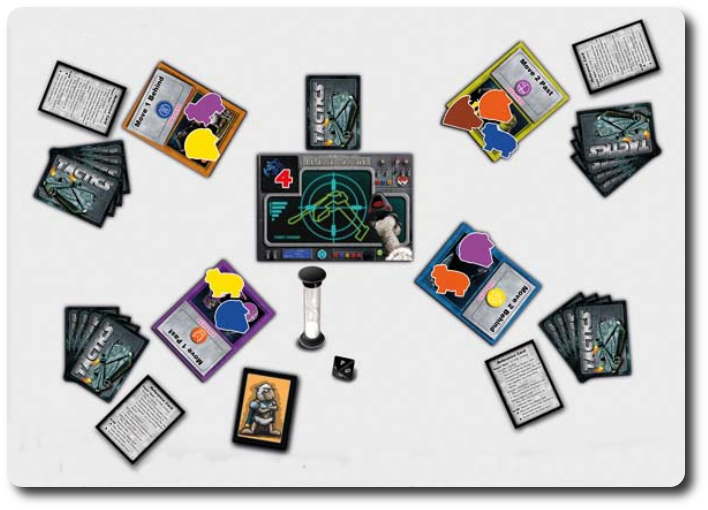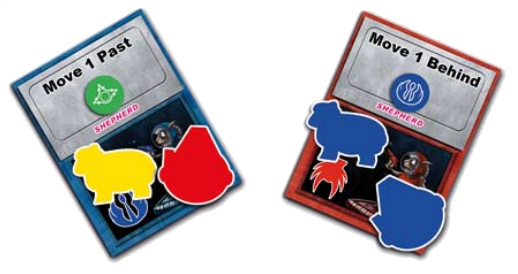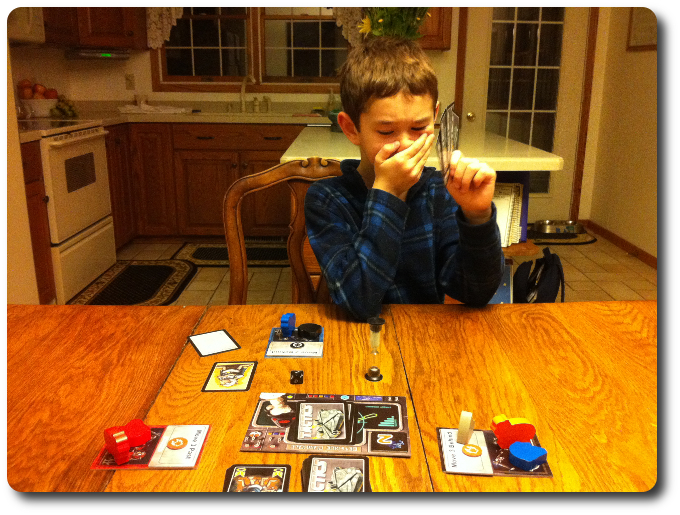
The Basics:
- For ages 9 and up (publisher suggests 10+)
- For 1 to 8 players
- Variable game length
Geek Skills:
- Active Listening & Communication
- Counting & Math
- Logical & Critical Decision Making
- Reading
- Pattern/Color Matching
- Strategy & Tactics
- Risk vs. Reward
- Visuospatial Skills
- Cooperative & Team Play
- Hand/Resource Management
- Reflex & Speed
- Bluffing and Misdirection
Learning Curve:
- Child – Moderate
- Adult – Easy
Theme & Narrative:
- Cooperatively work together to save your sheep from space wolves!
Endorsements:
- Gamer Geek mixed!
- Parent Geek mixed!
- Child Geek rejected!
Overview
Working together as a team can be difficult, especially if you don’t agree with the direction the group is going. Communication is key, as is the ability to be diplomatic. Despite what you might believe, you don’t know it all and you are often the last one to realize it. In this game, you’ll have to work together to solve a puzzle, but you don’t have a lot of time to attempt it. Work quickly and with each other to obtain victory!
Space Sheep!, designed by Anthony Rubbo and published by Stronghold Games, is comprised of 8 Space Sheep (in 8 different colors), 8 Shepherds (in 8 different colors), 1 Wolf, 8 System mats (in 8 different colors), 1 Defense Console board, 32 chits (in 8 different colors, 4 per color), 1 Neutral System mat, 11 Allegiance cards, 23 Instruction tiles, 8 Reference cards, 1 sand timer (approximately 1 minute long), 4 Wolf Strength counters, 1 standard eight-sided die, 1 Supreme Commander card, 90 Tactics cards, and 1 cloth bag. All the components in the game are very well made. The Space Sheep, Shepherds, and Wolf are wood and cut in the same fashion as the traditional wooden meeple. Of particular note here is the Shepherd, which intentionally looks a great deal like the Star Wars Millennium Falcon.
Game Set Up
Note: Space Sheep! has to different modes of play. These are Family and Advanced. The following game set up and game play is for Family mode of play. The Advanced mode of play is summarized in the Game Variants section below.
To set up the game, first select 4 colors from the 8 that are provided. These are the only colors that will be used in the game. From the 4 colors selected, collect the following components and set them aside. Any colors not selected should remain in the game box.
- 20 Tactics cards (4 of each color, plus 1 wild card)
- 16 chits (4 of each color)
- 4 System mats (1 of each color)
- 4 Space Sheep (1 of each color)
- 4 Shepherds (1 of each color)
Second, place the Defense Console board in the middle of the playing area and within easy reach of all the players.
Third, find and place the Wolf Strength counter with the number “4” on it and place it on the upper left corner of the Defense Console board.
Fourth, shuffle the Tactics cards and deal 4 out to each player. Place the deck, face-down, above the Defense Console board. This is the Tactics card draw pile for all the players for the duration of the game. Players should not look at their cards at this time!
Fifth, place the 4 System mats around the Defense Console mat and then randomly place 1 Space Sheep and 1 Shepherd on each. Make certain that the randomly placed Space Sheep and Shepherds are not placed on a System mat that matches its color.
Sixth, shuffle the Instruction tiles and randomly place 1 on each of the System cards, face-up. Place the remaining Instruction tiles back in the game box.
Seventh, place the colored chits in the cloth bag and mix them up. Then randomly draw 1 for every “chit space” on the Instruction tile. Some Instruction tiles could have none, 1, or 2. Place the bag and unused chits back in the game box.
Eighth, give 1 player the Supreme Commander card and have them randomly place the Wolf on any of the 4 System mats.
Ninth, give each player 1 Reference card and place the sand timer with the eight-sided die within easy reach of the player who has the Supreme Commander card. When completed, your game playing area will look similar to the following example.

This completes game set up. Get ready to burn some midi-chlorians.
Logic and Reason
Space Sheep! is both a Real-Time game and a Cooperative game. This means that all the players will be working towards the same goal within a defined game playtime limit. Since players are working together, they are welcome (and encouraged) to openly discuss how the game should be played, what actions should be taken, and provide advice when and where warranted. Players may also discuss their Tactics cards, but cannot show them to the other players.
Step 0: Pre-Game Launch
To begin the game, the player with the Supreme Commander card takes the following actions in the order given.
- Start the sand time (flip it over)
- Roll the eight-sided die and move the Wolf clockwise that number of System mats
- Tell the players to look at their Tactics cards
The goal of the game is to relocate all the Space Sheep and Shepherds to their home system (the System mat that matches the meeple color). The game is played in turns with no set number of turns in a single game. A typical player’s turn is summarized here. The player with the Supreme Commander card goes first with turn order sequence continuing clockwise.
Step 1: Choose an Option
A player has 4 different options available to them during their turn, but only 1 option can be taken per turn. Each option allows for a specific action.
Note that only 1 Space Sheep and 1 Shepherd can occupy a System mat at anytime. If a Space Sheep or Shepherd is moved onto a System mat, it displaces the same meeple type (but different color), forcing it to swap System mats.
Option 1: Activate a System
The player selects 1 Tactics card from their hand that matches the color of the System mat they want to activate. The player then performs one of the following actions:
- Move the Shepherd on the activated System mat in accordance to the Instruction tile.
- Move the Space Sheep on the activated System mat in accordance to the Instruction tile
- Move both the Space Sheep and the Shepherd on the activated System mat in accordance to the Instruction tile, but ONLY if they are the same color.

The Instruction tiles list an action and the colored chit located on the Instruction tile further defines the action. A player need only follow the instructions and use the colored chit to identify how it should be used in accordance to the colors in play.
Option 2: Activate a Shepherd
The player selects 1 Tactics card from their hand that matches the color of the System mat they want to activate and moves the Shepherd 1 System mat clockwise.
Option 3: Go Defensive
The player selects any Tactics card from their hand and places it face-down in the middle of the Defense Console board. The player takes no other action as the result of the card played, but has helped all the players build up their defenses from upcoming attacks from the dreaded Wolf.
Step 2: Attack!
This step is optional and allows the player to attack the Wolf. If the Wolf meeple is standing up, the player can move it to its side by playing a Tactics card that matches the color of the System mat the Wolf is located on. The Tactics card is placed in the face-up discard pile. The player with the Supreme Commander card can now take the following actions AT ANYTIME during the game for free in the order given.
- Flip the sand time over
- Roll the eight-sided die and move the Wolf clockwise that number of System mats
- Stand the Wolf up
This allows the players to keep the sand timer from running out, but only the player with the Supreme Commander card can flip the sand timer over.
Step 2: Draw Tactics Cards
When the player has finished the action associated with their selected option, they draw Tactics card from the draw pile to bring their hand back up to 4 cards. This completes the player’s turn. The next player in turn order sequence now goes starting with step 1 noted above.
Wolf Attack!
The sand time will continually run while the players are playing the game. If the sand timer should ever run out, the Wolf attacks, regardless if it’s on its side or not. The player with the Supreme Commander card takes the following actions in the order given.
- Start the sand time (flip it over)
- Discard a number of Tactics cards equal to the Wolf Strength counter first by taking them from the face-down pile on the Defense Console board, then from the draw pile, and finally from one or more players’ hands (selected by the Supreme Commander).
Winning or Losing the Game
If the players are able to move all the Space Sheep and all the Shepherds to their matching colored System mat, everyone wins!
If the players are ever forced to discard cards due to a Wolf attack and cannot discard the number required, everyone loses!
Game Variants
Advanced Play
Advanced mode of play is just like the Family mode of play, but provides for customization. Technically, players could decide to make the Advanced mode of play easier than the Family mode. When setting up the game, the following choices can be made.
- Adjust the number of System mats (more systems makes for a more difficult game)
- Adjust the number of Tactics cards (fewer cards makes for a more difficult game)
- Adjust Wolf Strength value (higher number means more cards are discarded – infinity means the Wolf automatically wins!)
- Adjust Instruction tiles (keep it random or decide from the total which ones you specifically want to use)
- Use Allegiance cards
The Allegiance cards deserve a bit more explanation than just a bullet point. During game set up, each player is dealt an Allegiance card that is kept secret at all times. These cards identify a player as either a “Defender” or an “Infiltrator”. Defenders win the game as described above, but the Infiltrators win if the Wolf wins! Obviously, Infiltrators should take actions to impede any progress towards victory, but must do so in a way that doesn’t draw negative attention. During the game, players can take a vote and knock a player out of play. This game variant adds a traitor aspect and quickly turns a game of cooperation into a game of skillful espionage and guile!
Going Solo
Space Sheep! can be played alone as a solitaire game. The same rules are followed, except it’s up to one player to attempt to move the pieces into the correct position.
House Rules
Space Sheep! is not a difficult game for adults to grasp, but the level of focus necessary to solve the logic puzzle within the game while constantly being pushed by the sand timer is downright stressful. Especially for Child Geeks and non-gamers. Using the Advanced mode of play, we opted to keep the number of systems down to 4, but removed the Wolf and sand timer altogether. This proved to make the game an enjoyable experience for the youngest of our Child Geeks and served as an excellent way to teach the game, but was also a game we would never lose. As our players became more comfortable and familiar with the game play, the Wolf and sand timer were reintroduced.
To learn more about Space Sheep!, visit the game’s web page.
Prediction
Cooperative games are a lot of fun with the family and with friends. They let players work together and interact with each other on a social level not available in games were players are competing against each other. Real-Time games add an element of immediacy and energize players, keeping everyone in the game and focused at the table. Mixing the two can lead to frantic fun or frantic failure. For example, Farns Filoworth’s Dirigible Disaster was well-loved by all who had the opportunity to play it. Meteor, on the other hand, proved to be a much more complicated game and left the Child Geeks bruised. Space Sheep! has elements that I think all our players will enjoy, but what has me worried is the sand timer.
Any game that has a timed element to it demands that one or more players need to watch the timer. This takes eyes off the game. That’s not a good thing when the game is a cooperative. Everyone needs to be watching the game play area and thinking about how they can help, not watching the small grains of sand tumble down. Additionally, the sand timer and how it’s used is going to add a palatable level of anxiety for some of our players. That’s never a good thing.
Teaching Space Sheep! is best done by setting up the game board and going through a dry run WITHOUT THE TIMER OR THE WOLF! I cannot stress that enough. This is not a game you can learn as you play and the constant need to focus makes it impossible to take a moment to stop and think about what you have learned. The learning difficulty for the Child Geeks and non-gamers was moderate at best. The game itself is not overly difficult to grasp. What is difficult is keeping all that needs to happen straight in your head. I personally found the Reference cards to be a delightful, albeit unintentional, joke. Players don’t have time to read the card. Heck, they hardly have enough time to play the game!
Note that the only necessary reading in the game (other than the rules) involves the Instruction cards. Players who cannot yet read or read quickly can play Space Sheep!, but will need all the other players to help them quickly remember what special rules each System mat has attached to them.
And so, after teaching the game to my two oldest little geeks, I asked them their thoughts on Space Sheep! so far.
“I like games like this where we all get to work together to beat it!” ~ Liam (age 9)
“So this is Star Wars, but with sheep?”~ Nyhus (age 6)
Honestly, the Star Wars theme is so pasted on that the fumes from the glue will make you feel dizzy. There is nothing about this game that has anything to do with Star Wars. The Shepherd meeples look an awful lot like the Millennium Falcon, but that’s about it. The game attempts to parody Star Wars, but never does so.
Let’s play Space Sheep! and see if the game play is more interesting than the game’s theme.
Final Word
We first tried the Family mode and it proved to be a game that all but our oldest Child Geeks enjoyed. The majority of Child Geeks found the game to be too fast, too difficult, and too intense. The sand timer was a distraction and players kept looking at it instead of the game. When it was a Child Geek’s turn, they more times than not froze and the older Child Geeks and adults had to intervene. According to one Child Geek, “This game is too hard. I don’t have enough time to save the sheep!” Only the oldest and most experienced of our Child Geeks played the game long enough to see it end in victory or defeat. Adjusting the game’s difficulty (see the House Rules) helped a great deal, but the damage had already been done. When the votes came in, the majority of Child Geeks elected to reject it, finding it to be a game that was “more work than play”.

My oldest little geek watches the other players and the game closely, thinking about his next move
The Parent Geeks were disheartened by their efforts to play the game with their family, but their level of fun with their peers was much improved. Space Sheep! played very well with couples, but drastically took a negative turn when 5 or more players attempted to defeat the evil Wolf. Again, the players found the game to be too frantic. Despite every player understanding what was necessary to win, the groups tended to vapor lock and burn up too much of their time in discussions. A number of our groups stopped the game before it was technically done because they didn’t believe they could win, but a number of the more experienced Parent Geeks kept at it. According to one Parent Geek, “This is a very challenging game, but not one I would recommend unless I knew the other players could handle it.” Many of the games after the first were modified, adjusted according to the group’s level of skill and experience. This saved the game from certain rejection, but the final vote was not enough to give it a full endorsement. According to one Parent Geek, “This game is just a bit too difficult to play casually or often.”
The Gamer Geeks, who had already heard of this game, were eager to see if it was as difficult as they said. Turns out it wasn’t. At least, not the Family mode. The Gamer Geeks worked well together and beat the game the first time they played it. Which, according to popular opinion, was due to their “level of awesomeness”, but I think not. Space Sheep! is a game of communication and fast thinking. The Gamer Geeks were able to do both thanks to their many, many hours of game playing. What Space Sheep! was asking of them was old hat. They found the game to be predictable and solvable. So, of course, I made the next game more difficult by adding all the systems. They failed to win, so we scaled it back to 6 system sand they barely lost. With 5 systems, they won, so we increased the Wolf Strength and they lost. Lastly, we tried with 4 systems with the traitor aspect in play. Again, the Gamer Geeks lost. According to one Gamer Geek, “I like what the game is about, but it would appear to be designed to kick you in the teeth.” Another Gamer Geek rejected this idea and said, “This is a game that you can make as difficult as you like, but it’s also a game you will either be good at or suck at.” On that point, I agree. Space Sheep! is not a game that forgives and is most certainly not a game that gives you the ability to learn as you play. Unless, of course, you count the wisdom that comes with defeat. In the end, the Gamer Geeks were mixed when it came to their thoughts on the game’s level of endorsement. There were 2 camps, primarily. Those who liked games that could be solved and played without a time restriction and those who liked the added difficulty of being forced to focus to achieve success.
Space Sheep!, based on our observations, is a “love it or hate it” kind of game. It certainly seemed to polarize our groups, pleasing some and frustrating others. Personally, I enjoyed it. It provided an interesting logic puzzle that I got to work through with friends. Of course, my friends frustrated me and I’m sure I was no peach to work with either. Games can be intense, especially when playing with others who love to win. This leads me to believe that Space Sheep! is not a “casual game”. There is just too much focus and pressure to play that leaves most with a headache.
Space Sheep! will drain you. It’s a game full of frantic activity that will generate laughter or tears. Probably both. It’s an interesting real-time cooperative puzzle game that was designed to do one thing: challenge you. Brilliantly, the game comes with so many customizable parts that you can adjust the game’s difficulty according to your likes and dislikes. I fear that many will turn their back from the game after only 1 play session without having an opportunity to adjust the game’s difficulty. I know I would have if it weren’t for the fact that I had to play the game multiple time. I’m so glad I did. There’s much more to this game, but I have yet to feel like I have conquered it. Probably won’t for a very long time.
I’m keeping the game. It’s one I can play solo or with friends, and it packs a punch. I just need to remember to adjust the game to the larger audience instead of my own personal preferences.
This game was given to Father Geek as a review copy. Father Geek was not paid, bribed, wined, dined, or threatened in vain hopes of influencing this review. Such is the statuesque and legendary integrity of Father Geek.




Pingback: Today in Board Games Issue #120 - Today in Board Games